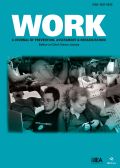Authors: Lindh Falk, Annika E. | Sandqvist, Jan L. | Liedberg, Gunilla M.
Article Type:
Research Article
Abstract:
Background: Employment is a priority in the European Union, and it is essential to address the needs of individuals disadvantaged at the labour market on grounds such as ethnicity, age, gender or disability, to increase the opportunities for these groups to gain employment. The Council of the European Union recognize the important role of national organisations in increasing gender equality and the need to integrate a gender perspective in all policies. Gender equality perspectives should also,
…according to the EU Plan of Action and Gender Equality be integrated in education. Objectives: To equip students in higher education with knowledge, about gender, age, disability and ethnicity in relation to employability, a European group initiated a project; Euro-Education: Employability for all (EEE4all). Approach: The project, funded by the European Lifelong Learning Programme, was aimed to develop and implement four course modules, each relating to employability with different focus: gender, age, disability or ethnicity. In this paper design, implementation, and evaluation of the course focused on gender, provided by the Occupational Therapy Programme at Linkoping University, is described. Conclusions: The students highlighted the importance of awareness and knowledge about gender theory and its application in relation to employability and client-centred approach.
Show more
Keywords: Occupational therapy, gender, e-learning, vocational rehabilitation, course design
DOI: 10.3233/WOR-2012-1311
Citation: Work,
vol. 41, no. 4, pp. 433-438, 2012
Price: EUR 27.50






